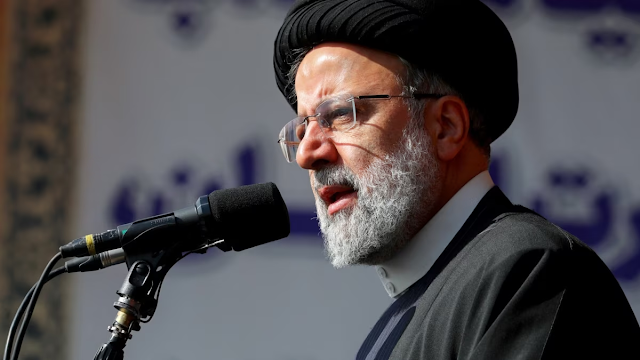Iran's Economic Future Is Uncertain After Raisi Visits China
For the first time in twenty years, Iranian President Ebrahim Raisi visited Beijing from February 14-16, marking his first foreign trip of the year. In addition to the foreign minister, the central bank chief, and oil and mining ministers, he traveled with a large delegation.
Taking a trip such as this, the Iranian government is likely hoping to achieve domestic political objectives. After sanctions and the death of Mahsa Jina Amini due to the morality police sparked several months’ worth of protests, it is clear that some positive news would go a long way. The three days spent in Beijing could be utilized to alter the storyline. China has been a major trading partner for Iran over much of the century, with their financial support being like a lifeline for the administration, when lacking other options.
Chinese President Xi Jinping called for an end to sanctions against Iran in most public messaging. Moreover, he said China would take constructive steps to resume nuclear negotiations with Iran. In light of Iran's response to protests, few other countries—other than China and Russia—are interested in working with Tehran, so Xi's statements are merely symbolic until this changes.
As a context for the trip, it is essential to note that Xi visited Riyadh, Iran's Gulf rival, in December 2022. That week, China held three summits—a bilateral one with Saudi Arabia and a multilateral one with the Arab League and the Gulf Cooperation Council (GCC), emphasizing its close ties to countries across the Middle East, where Iran is generally seen as disruptive at best and an enemy at worst.
The Saudi trip resulted in billions of dollars worth of deals and memorandums of understanding, creating a marked difference to the comprehensive strategic partnership with Iran established in 2021. Chinese firms have invested a minuscule $185 million in Iran since then, causing Deputy Economy Minister Ali Fekri to note his dissatisfaction with their capacity for investment during a recent interview. In comparison, AEI data reveals Chinese investment near the $5.5 billion mark over the same period for Saudi Arabia.
Things were looking grim for Tehran when China and the Gulf Cooperation Council (GCC) released a joint statement during their summit. Expressing support for the International Atomic Energy Agency (IAEA), they emphasized the need to maintain peace about Iran's nuclear program to uphold regional and international security. Moreover, they declared their backing of the UAE in reaching a peaceful resolution regarding three disputed islands in the Strait of Hormuz. The conflict, which has been ongoing since 1971, involves three isles that Iran has occupied that were formerly administered by Ras al-Khaimah and Sharjah.
Iran's reaction was a mixture of outrage and concern. The Iranian government summoned Ambassador Chang Hua to express its official displeasure, while public commentary worried China was abandoning Tehran. According to a former Iranian diplomat, Abdolreza Farji Rad, “I never thought China would ever harm Iran’s interests...if this trend continues in China’s behavior, in less than a decade, China will cause Iran as much concern as it does today.”
Iranian leaders must be concerned about the prospect of a less committed China. In light of Russia's disastrous involvement in Ukraine, the threat of Chinese abandonment would leave the Islamic Republic more alone than it has ever been. Raisi's trip was his chance to prove that his government has yet to completely mismanage its most important bilateral relationship with the people back home.
The canceled visit of Secretary of State Antony Blinken to Beijing may have influenced Chinese leaders' reasoning. With the conclusion of their zero COVID policy and the return to normal life, the Chinese government has been striving to rebuild ties fractured by recent developments. It is likely more due to domestic tension than international pressures that compel them to do this; issues such as youth unemployment, the sluggish economy, dissatisfaction with their pandemic control strategies, and apprehension of a significantly aging population are foremost in the CCP's minds.
With blinken's trip canceled, the list of problems keeps growing. People in China, already frustrated, cannot be happy to see their government get bogged down in another unnecessary spat with the United States, China's largest economic partner, with trade between the two hittings a record $690 billion by 2022.
When it comes to material effects, a visit from Iran's president likely won't have much of an impact. China holds a lot more influence over Iran than the other way around, but there is an agreement between them on matters of opposition to Western "hegemony and bullying". This could lead to more meaningful collaboration between the two countries. For example, Iran's full membership in the Shanghai Cooperation Organization will bring prospects for better coordination with respect to security, transnational crime, and counterterrorism - increasing the importance of their relationship.
Leaders in China need to be cautious when sending a message to the Iranian people, using the past of their connection as a reference. In August 1978, two days after Prime Minister Jamshid Amuzegar and his cabinet stepped down due to being unable to bring back peace during the protests, CCP Chairman Hua Guofeng visited Shah Mohammad Reza Pahlavi in Iran. Ignoring the demonstrations occurring, his prominent appearance was “a mistake for PRC diplomacy”, causing “animosity among the Islamic revolutionary powers set to take power in Iran soon.”
One of the country's most prestigious universities, Peking University, awarded Raisi an honorary professor title on February 15, recognizing his contributions to maintaining peace and stability in the region and throughout the world. The Iranian president is receiving an award from China for killing hundreds of Iranians and detaining tens of thousands since protests erupted in September 2022. This is an act Iranians will never forget.

.png)
Comments
Post a Comment